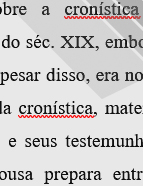

................................
In his reference to Acenheiro's chronicles, Inocêncio da Silva, in Diccionario bibliographico portuguez [Portuguese bibliographical dictionary] (1859, t. 2, p. 73), further added: "our historian [Herculano] classifies that work as nothing less than a 'pack of lies and nonsense, published by our Academia, which would have been more prudent to have left it to gather dust in the libraries”. In the 20th century, Joaquim Barradas de Carvalho viewed Herculano's historiographical model as an "epistemological revolution", a break with the tradition from the early days of the Academia das Ciências and abade Correia da Serra. Conversely, Borges de Macedo stated that the editor of the Portugaliae was indeed a follower of that history-science tradition.
Nevertheless, the historiography on chronicle production, influenced by the effort of returning to the original documents - the "marble" of the "polygonal column" that Herculano compared to History (Opusculos IV [Opuscula IV], undated [1842], p. 220) - and its depuration, would continue to develop until the end of the century. It became simultaneously more positivist, in the dating and attribution of authors to the texts, in its aim geared towards objectivity and accuracy of the "proof" presented and, in the manner of Fustel de Coulanges, in the closest possible reading of the texts. To mention but one example, these document appreciation principles are evident in Ernesto do Canto. The Azorean historian's writings and annotations on some of Zurara's chronicles, published in the Boletim de Bibliografia Portuguesa [Portuguese Bulletin of Bibliography] (1879), focused almost exclusively on the analytical comparison of chapters and the exactness of the wording in the treslados, which led him to unleash harsh criticism on the changes introduced by abade Correia da Serra in the editions prepared by the latter for the Academia das Ciências. Thus, with a century between them, two conflicting perspectives clashed. Moreover, until the end of the monarchy Zurara's chronicles were the ones that most captivated historians, perhaps because they mirrored the prevailing colonialist mentality.
Until the late 19th century and early 20th century, the editorial policy based on such nineteenth-century copies continued to flourish autonomously. The editions of Fernão Lopes' s trilogy in the Bibliotheca de Classicos Portuguezes [Portuguese Classics Library], published in the last years of the 19th century by Luciano Cordeiro, were not only based on the teachings of abade Correia da Serra, but also dispensed with the preface and critical annotation.
